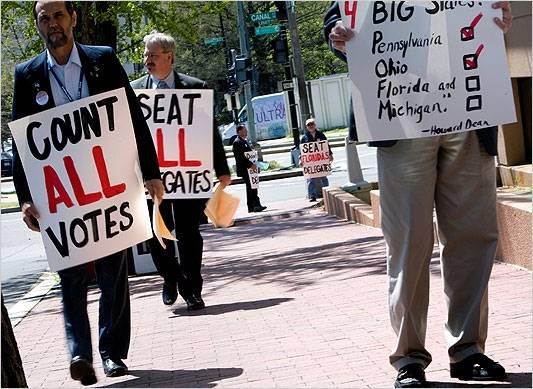The Inexistent Problem: Shedding Some Light on Why the Primaries Are So Darn Complicated
Normal
0
false
false
false
MicrosoftInternetExplorer4
Primary elections are complicated. To be more accurate with terminology, the Presidential candidates’ nomination process is complicated. This year, as everyone knows by now, the whole process has gotten even more confusing – at least on the indecisive Democratic side. Last Saturday came the latest piece to this nebulous, incomprehensible puzzle: the decision by Democratic party officials to seat delegates from Michigan and Florida with half a vote each during the 2008 National Convention. What exactly does this mean? Why is the party so angry at Michigan and Florida? Is there an anti-Hillary plot within the party? Let’s try to create order from the chaos and give some much-needed answers...
Until 2008 the most researched and talked-about problem concerning primary elections was the so-called “front-loading problem”. “Front-loading” is a technical term unknown to the general public and of very little diffusion among political scientists. It is nevertheless largely known among those who study, analyse or were interested in the Presidential nominating process before 2008. An impressive number of scholarly works were written about this problem and it was probably the most interesting subject of research within the literature on Presidential primaries. It concerns the distribution of Presidential primary elections during the months of the so-called “primary season”. The whole point is that more and more states choose early dates to dispute their primary elections, making the Presidential nominating process a “front-loaded” process.
The first state that undertook to move up its primaries was New Hampshire in 1916. The decision as to when to hold the primary elections was made during “Town Meeting Day”, probably to save some public money. In 1920, for the first time, the New Hampshire primaries opened the primary season. Very soon the great majority of citizens and politicians from New Hampshire understood that opening the primary season was a great privilege that put their state in the national spotlight and allowed it to play a prominent role in Presidential politics. Their primary at the time was held during the second Tuesday of March of a Presidential-election year. In 1971 Florida moved its primary elections to the second Tuesday of March. In response, New Hampshire anticipated its contests to the first Tuesday of March. Four years later other New England states tried to organize a “regional primary” in a bid to align their primaries with those of the Granite state. Even before this proposal became a concrete idea, New Hampshire approved a law according to which the state is required to hold its primaries at least a week before any other primary in the country. At this point no state could challenge New Hampshire’s “first-in-the-nation” primary election – although Delaware tried again in 1996, voting only 4 days after the New Hampshire primaries – but more and more states started to move their contest to early dates to maximize their influence within a process that almost always allowed candidates to lock the nomination within one or two months after the first ballot had been cast. Starting in 1968, most contests started to be disputed between the first and second months of the primary season.

To face the rising trend of “front-loading”, political parties – especially the Democratic party – began to adopt internal regulations concerning the seating of delegates. The history of National Conventions is full of outrageous episodes concerning the recognition and seating of delegates from state parties. The lowest point was reached right at the beginning of the Convention’s history, in 1835, when the Democratic party of Maryland decided to send 188 delegates that could cast only 10 votes, while a private citizen from Tennessee that was visiting the city of Baltimore during the Convention ended up casting his state’s 15 votes. Nothing that ridiculous has happened since then, but delegations have been challenged, recognized and sent away on a regular basis throughout the years. This year the recognition and seating problems started early, due to the way Florida and Michigan acted.
Both states, inspired by years of primary seasons during which contests were decided early, chose to move their primary elections to the very beginning of the season. On the other hand, the Democratic party, informed by years of scholarly research into the “front-loading problem”, approved a rule according to which no state is supposed to hold primary elections before February 5th. The party’s rule did not apply to New Hampshire, of course, that by now has the divine right to hold its primary before everybody else, but also to Nevada and South Carolina, who were granted special permission to hold their primaries before February 5th for political reasons. Michigan and Florida wanted to challenge what they perceived as the Democratic party’s tyranny and held their contests before the “legal” date. To punish their insurrection, the party threatened not to seat delegates from these two states. It was then decided last Saturday that delegates will be seated, but will be casting only half a vote each.
Now that the whole issue should be more clear, we can focus on the irony of the story: Michigan and Florida ended up losing at least half of their influence in this year’s Democratic Presidential nomination to vote before others, in a contest that will end without a clear decision, where states voting late got more attention from candidates and the media than states voting early. Meanwhile, the Democratic party continues to tear itself apart and sacrifice its unity to implement a rule that is thought to fight “front-loading”, a problem that this year is THE inexistent problem.


































i-Italy
Facebook
Google+
This work may not be reproduced, in whole or in part, without prior written permission.
Questo lavoro non può essere riprodotto, in tutto o in parte, senza permesso scritto.